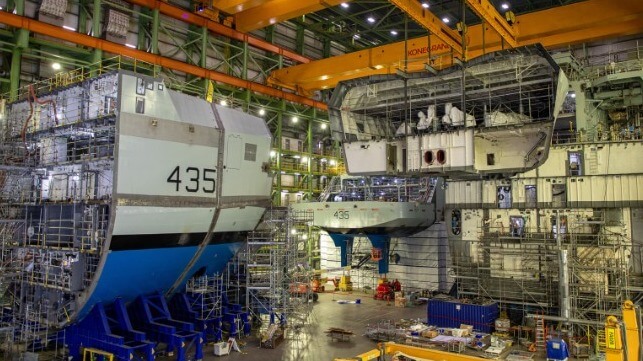Canadian Coast Guard Names its Two New Arctic Patrol Ships

The Canadian Coast Guard has named two of its Arctic and Offshore Patrol Ships (AOPS) after two Arctic glaciers. The naming ceremony was part of the official keel laying for the AOPS 7 and start of construction for the AOPS 8 at Irving Shipbuilding, Halifax Shipyard.
AOPS 7 will be named after the Donjek Glacier, located in Kluane National Park in Yukon. AOPS 8 will be named after the Sermilik Glacier, located in Sermilik National Park in the Canadian Arctic territory of Nunavut.
The two vessels are expected to offer the Canadian Coast Guard with increased capability for Arctic and ice-breaking operations. The vessels’ names symbolize their role in protecting marine environment across the Atlantic and the Canadian Arctic.
“We are one step closer to having these two modern and versatile ships join our fleet. This represents an important milestone in renewing the Canadian Coast Guard fleet,” said Mario Pelletier, Commissioner, Canadian Coast Guard.
Irving Shipbuilding, Halifax was awarded the engineering contract for the two AOPS back in 2019. The construction of the vessels is part of the Canadian National Shipbuilding Strategy. This includes government efforts to renew the coast guard fleet as well as revitalize the country’s shipbuilding industry.
To date, three large vessels and 18 small vessels have been delivered to the Canadian Coast Guard under the National Shipbuilding Strategy. The two AOPS currently under construction at Irving will replace two of the five existing Offshore Patrol vessels.
The AOPS series was designed for the Royal Canadian Navy, and the early hulls in naval service have seen an elevated rate of technical difficulties, from excess lead in drinking water systems to deck crane breakdowns to an inability to use their towing gear.

that matters most
Get the latest maritime news delivered to your inbox daily.
Canada has the world’s longest coastline and longest Arctic coast. To assert its power in the remote region, Canada committed to strengthen its coast guard and the navy. Besides the acquisition of the Arctic patrol vessels, Canada has recently announced that it will be procuring up to 12 submarines to shore up its defense of the Arctic.
China and Russia are seen to be teaming up to build infrastructure and increase vessel traffic in the Arctic, which they could leverage in future to increase their influence in the region.
